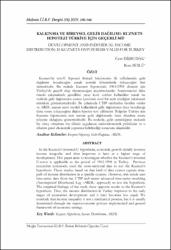Kalkınma ve bireysel gelir dağılımı: Kuznets hipotezi Türkiye için geçerli mi?
Abstract
Kuznets’in ters-U hipotezi iktisadi büyümenin ilk safhalarında gelir dağılımın bozulacağını ancak sonraki dönemlerde iyileşeceğini ileri sürmektedir. Bu makale Kuznets hipotezinin 1963-1998 dönemi için Türkiye’de geçerli olup olamayacağını araştırmaktadır. Araştırmacılar daha önceki çalışmalarda genellikle yatay kesit verileri kullandılar ancak bu verilerle gelir dağılımının zaman içerisinde nasıl bir seyir izlediğini yakalamak mümkün görünmemektedir. Bu çalışmada UTIP tarafından üretilen veriler ve ARDL zaman serisi modeli kullanılarak gelir dağılımının önce bozulacağı daha sonra iyileşeceğine ilişkin hipotez test edilmiştir. Bulgular Türkiye için Kuznets hipotezinin tam tersine gelir dağılımında önce düzelme sonra iyileşme olduğunu göstermektedir. Bu nedenle, gelir eşitsizliğinin mekanik bir süreç olmaktan öte ülkede uygulanan makroekonomik politikalar ve o ülkenin genel ekonomik yapısınca belirlendiği sonucuna ulaşılabilir. In the Kuznets& #8217; s inverted-U hypothesis, economic growth initially worsens income inequality and then improves it later at a higher stage of development. This paper aims to investigate whether the Kuznets& #8217; s inverted U-curve is applicable to the period of 1963-1998 in Turkey. Previous researcher commonly used the cross-sectional data to test the Kuznets& #8217; s hypothesis. Those studies based on that kind of data cannot capture time-path of income distribution in a specific country. However, this article uses time-series data from the UTIP and recent advanced time-series modeling (Autoregressif Distributed Lag & #8211; ARDL- approach) to test the hypothesis. The empirical findings of the study show opposite results to the Kuznets& #8217; s hypothesis. Thus, the income distribution in Turkey improves in the early stages of economics development and it later becomes less equal. We conclude that income inequality is not a mechanical process, but it is usually determined through the macroeconomic policies implemented and general framework of economic settings.


















